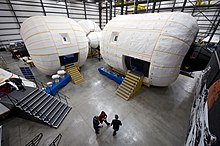毕格罗宇航
美国太空技术公司
(重定向自比格罗航天公司)
毕格罗宇航或比奇洛航天公司(Bigelow Aerospace)是一间位于美国内华达州北拉斯维加斯的太空技术创业公司,正在建造可充气式太空站。毕格罗宇航由罗伯特·毕格罗于1998年成立[3],资金在很大程度上是由毕格罗以旅店业者的身份积累财富而来。毕格罗先生的愿景是在宇宙中开启第一间酒店,也是宇航公司成立的最终目的。
| 毕格罗宇航 | |
|---|---|
| 公司类型 | 私人公司 |
| 成立 | 1999年 |
| 创办人 | 罗伯特·毕格罗 (创始总裁) |
| 代表人物 | 罗伯特·毕格罗, Blair Bigelow[1] |
| 总部 | |
| 产业 | 航太 |
| 产品 | 轨道舱室, 商业太空 |
| 员工人数 | 150人 (2018年12月)[2] |
| 网站 | bigelowaerospace |

直至2010年,毕格罗已为公司投资1.8亿美元[4]。毕格罗曾在多个场合表示,他准备资助毕格罗宇航约5亿美元到2015年,以实现推出全面的硬件[3][5]。2013年初,比格罗航天公司与美国航空航天局签署协议,于2013年年底之前,国际空间站上将测试由比格罗公司提供的微型模拟可充气式太空舱,进行可行性质检验。若通过,准备于2020年发射大型的可充气式太空舱与国际空间站连接,供空间站内宇航人员使用,直至2024-2028年国际空间站寿命结束为止[6]。

组件设计和商业计划
编辑公司正在开发一系列的原型和生产空间站组件,包括:
- 创始一号,一个三分之一大小的原型于2006年7月12日发射,重约3000磅(1,360公斤),尺寸约为14.5英尺(4.4米)乘5.25英尺(1.6米)。[7]
- 创始二号,与创始一号相同大小,加入其他系统进行测试和发送付费会员的物品。发射于2007年6月28日。[8]
- BA 330,一个完整大小的组件,满载时重约50000镑(23,000公斤),尺寸为约45英尺(13.7米)乘22英尺(6.7米)。[9]
| 组件类型 | 组件名称 | 发射日期 | 发射火箭 | 状态 |
|---|---|---|---|---|
| 创始探路者 | 创始一号 (Genesis I) |
2006年7月12日 14时53分30秒(UTC) |
第聂伯 | 发射成功,在轨道中[10] |
| 创始二号 (Genesis II) |
2007年6月28日 15时02分00秒(UTC) |
第聂伯 | 发射成功,在轨道中[11] | |
| 银河号 (Galaxy) |
已取消 | 已取消发射,进行过地面测试[12] | ||
| 太阳舞者 (Sundancer) |
已取消 | 已取消 | ||
| BA 330“鹦鹉螺号” (Nautilus) |
2014年-2015年 | 设计中;模拟舱测试中 | ||
| BA 2100“奥林匹斯号” (Olympus) |
初步规划中 | 初步规划中 | ||
参考资料
编辑- ^ https://twitter.com/BlairBigelow
- ^ 存档副本. [2020-02-09]. (原始内容存档于2020-02-11).
- ^ 3.0 3.1 Bigelow's Gamble (页面存档备份,存于互联网档案馆) Aviation Week & Space Technology, 2004-09-26, reprint (authorized), accessed 2010-02-17.
- ^ The Americans may still go to the moon before the Chinese (页面存档备份,存于互联网档案馆), The Economist, 2010-02-18, accessed 2010-03-04.
- ^ Mr. B's Big Plan (页面存档备份,存于互联网档案馆), Geoffrey Little, Air & Space Magazine, 2008-01-01, accessed 2010-02-18
- ^ “比格罗航天公司为国际空间站提供可充气式太空舱”,《载人航天》,2013年,第一期
- ^ Out There - Genesis I. BigelowAerospace.com. [2007-03-31]. (原始内容存档于2007-03-17).
- ^ Genesis II. (原始内容存档于2009-10-05).
- ^ David, Leonard. Bigelow Aerospace to Tackle Inflatable Space Habitats. Space.com. 2004-05-24 [2011-02-09]. (原始内容存档于2009-06-05).
- ^ David, Leonard. Bigelow Orbital Module Launched into Space. Space.com. 2006-07-12 [2007-03-11]. (原始内容存档于2006-07-12).
- ^ Malik, Tariq; and Leonard David. Bigelow's Second Orbital Module Launches Into Space. Space.com. 2007-06-28 [2007-06-29]. (原始内容存档于2007-07-18).
- ^ Special Announcement From Robert T. Bigelow (新闻稿). Bigelow Aerospace. 2007-08-13 [2010-05-03]. (原始内容存档于2008-03-31).
This dramatic rise in launch costs has forced us to rethink our strategy with Galaxy. Due to the fact that a high percentage of the systems Galaxy was meant to test can be effectively validated on a terrestrial basis, the technical value of launching the spacecraft - particularly after the successful launch of both Genesis I and II - is somewhat marginal. Therefore, we have decided to expedite our schedule yet again, and are now planning to move ahead directly with Bigelow Aerospace's first human habitable spacecraft, the Sundancer.
参阅
编辑外部链接
编辑- (英文)比格罗航天公司官方网站 (页面存档备份,存于互联网档案馆)